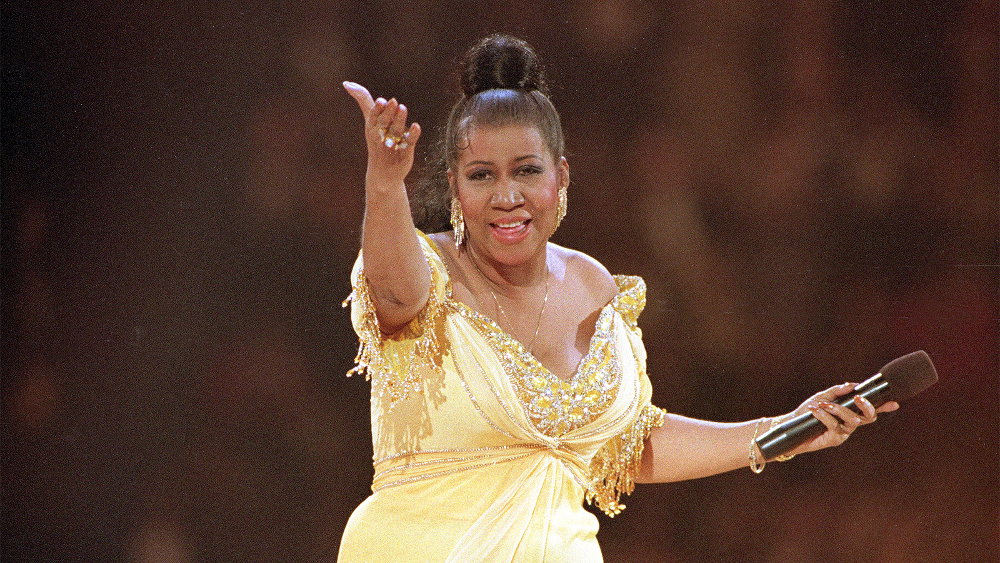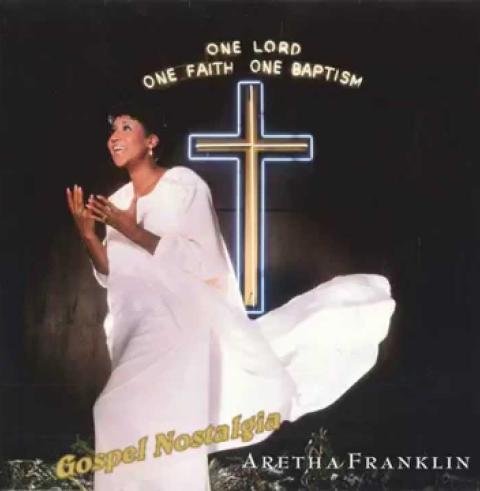
Rhythm and blues singer Aretha Franklin performs at the inaugural gala for President Clinton in Washington on Jan. 19, 1993. (AP/Amy Sancetta)
Aretha Franklin, a singer who began her career with gospel music and was later crowned the "Queen of Soul," died Thursday (Aug. 16) after battling a range of health issues. She was 76.
Often simply called "Aretha," Franklin got her start in the Detroit church of her pastor father, the Rev. C.L. Franklin. She was first recorded at his New Bethel Baptist Church on the album "Spirituals" at age 14.
"Aretha, like Al Green, is one of the few artists who is universally accepted in the black church," Bil Carpenter, author of "Uncloudy Days: The Gospel Music Encyclopedia," told Religion News Service. "The church often shuns artists who sing R&B as backsliders and reject them when they come back and sing gospel. However, Aretha's always been given a pass."
When Franklin, a Memphis, Tenn., native, who was raised in Detroit, was awarded the 2005 Presidential Medal of Freedom by then-President George W. Bush, the citation noted: "Her instantly recognizable voice has captivated listeners ever since she toured with her father's gospel revue in the 1950s."
Gospel and soul singer Candi Staton, who traveled on the gospel circuit with Franklin during that decade when they were teens, recalled that her friend was a "gifted singer even as a young girl," though no one knew then all the hits that would follow with her unique voice.
"What I love about it is that she never lost her connection to the church and that church training was always channeled through her music regardless of what she was singing," Staton told RNS. "She took you to church even if she was singing about a no-good man."
Carpenter said Franklin, a lifelong Baptist whose mother and sisters were gospel singers, continued to represent her church roots on stage and on some of her secular albums for decades after that, and influenced artists in genres stretching from R&B to country. But Franklin also inspired a range of gospel artists, from Richard Smallwood and The Hawkins Family to artists who came after them, such as Karen Clark Sheard, Donald Lawrence and Anita Wilson.
"It's the sheer power of her voice and the unique phrasing that distinguish her from her peers. In her prime, Aretha's voice took listeners to a place that few other artists' voices could take them," Carpenter said. "Whether she was singing a Broadway tune, a Jazz standard or an R&B song, she always brought that authentic black gospel flavor to it."
The singer who is known for "(You Make Me Feel Like) A Natural Woman" and "Respect" gave a nod to faith in the toe-tapping love song "I Say a Little Prayer." She begins her solo with "The moment I wake up/Before I put on my makeup/I say a little" before backup singers chime in with "prayer for you."
Advertisement
Her best-selling album, "Amazing Grace," a 1972 release, is among five Franklin recordings that are featured in the Grammy Hall of Fame.
"Critics always talked about the gospel feeling in Aretha's voice so it was a very big deal when she finally made a proper gospel album like 'Amazing Grace,' " Carpenter said. "For years, it was the best-selling gospel album by a woman ever ... until Whitney Houston's 'The Preacher's Wife' stole that top position at 3 million units."
Franklin's two-record set includes the classic hymn by John Newton as well as "What a Friend We Have in Jesus" and "God Will Take Care of You."
A Rolling Stone reviewer said Franklin "sings like never before on record" on that live album.
" 'Amazing Grace' is more a great Aretha Franklin album than a great gospel album," wrote Jon Landau at the time. "The liberation and abandon she has always implied in her greatest moments are now fully and consistently achieved."
Clara Ward, of the Ward Singers, and Mahalia Jackson were among Franklin's mentors. She sang "Precious Lord, Take My Hand," at Jackson's funeral and also performed the song, which was one of the favorites of the Rev. Martin Luther King Jr., at the 2011 dedication of the Washington memorial in his honor.
Sometimes Franklin spoke, rather than sang, about her beliefs.
When asked in 2017 by the Chicago Sun-Times about the importance of her faith, Franklin said: "It is very important. It certainly has sustained me to this day."

Aretha Franklin’s “One Lord, One Faith, One Baptism” album cover
Earlier, in 2013, she told The Associated Press that her healing from an undisclosed condition was considered "absolutely miraculous" after she had been ill for several months.
"I was talking to Smokey Robinson, my oldest best friend Smokey, talking about the fact that some doctors are not very well acquainted with faith healing," she told the AP. "And Smokey said, 'Well, they just don't know who your healer is.' "
Franklin, who received a Kennedy Center honor in 1994, was the first woman to be inducted into the Rock & Roll Hall of Fame in Cleveland, in 1987.
"In Aretha Franklin's sprawling career, she has taken on many roles — the devout gospel singer, the sensual R&B siren, the pop crossover phenom, Lady Soul — and dominated them all," the hall's website says.
The same year the hall of fame honored her, Franklin again recorded sacred music at New Bethel for the album "One Lord, One Faith, One Baptism," which won a Grammy for best soul performance.
One of her most recent Grammy wins was in 2007 for "Never Gonna Break My Faith" with Mary J. Blige. The song was featured on the soundtrack of the film "Bobby," which was about the 1968 assassination of U.S. Sen. Robert Kennedy. In 2010, she won a Grammy for "You've Got a Friend," recorded with Ronald Isley.
As news broke of her failing health, celebrities including Ciara, Missy Elliott and Mariah Carey tweeted that they were praying for her.
Franklin, who had announced retirement plans in 2017, had hoped to continue touring in 2018. After receiving a doctor's recommendation, she had been forced to cancel concerts in several North American cities.






